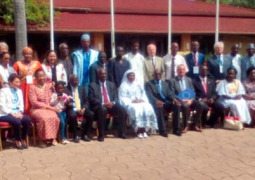The forum, the first of its kind in history of the ministry of Agriculture, was organised by the CPCU and funded by the Gambia Commercial Agriculture value chain management project, GCAV.
Held at Jenoi in the Lower River region, the forum entailed presentations by projects managers on implementation progress focusing on project activities, indicators and implementation challenges, as well as key learning points plus discussion.
Giving the objectives and expected outcomes of the forum, the coordinator of the CPCU, Falalo Touray, said the objectives included sharing and critically reflecting on the progress made on planned activities.
It was also to reflect on the progress made towards Gambia National Agricultural Investment Programme (GNAIP) targets, to improve implementation efficiency by identifying areas of duplication and complementarities and synergy in AWPM, and to harmonise critical approaches and practices among projects.
According to Mr Touray, the planned output of the forum was to consolidate the 2014 Agric-sector annual progress report, to consolidate the 2015 annual work plan and budget, as well as to consolidate GNAIP indicators based on progress reports from 2011 to 2014.
In his opening remarks, the permanent secretary number 2 at the Ministry of Agriculture, Sherrifo Bojang, stressed that they were witnessing the maiden annual agric-sector project progress review and planning workshop, which has the potential of being a game-changer.
PS Bojang further added that the agricultural sector is the most important sector of the Gambian economy.
He said the forum is an opportunity to strengthen their conditions, as well as show evidence of their achievements as a sector.
According to him, GNAIP is the medium-term strategic plan of The Gambia (2011-2015).
The framework outlines strategic policy guiding project design, resource mobilization and allocation, and implementation across the agriculture sector.
The development objective of GNAIP is to increase food and nutritional security and household incomes through the six strategic themes.
“Agricultural projects form an important part of agricultural expenditure from government financing in the agricultural sector and GNAIP,” PS Bojang went on.
From 1994 to date, the Gambia government has presided over a sustained and significant increase in the number and size of development projects, budget allocation and commitment of the donor community to the agric-sector.
“This is a drive by both the existence of clear sector policies and strategic direction,” Bojang said, adding that the government has presided over a sustained and significant increase in the number and size of the development project budget allocation, and commitment of the donor community to the agricultural sector.
The Director General at the Ministry of Agriculture, Ousman Jammeh, thanked the GCAV coordinator for organising such a forum, which was “the first of its kind in the Ministry of Agriculture”.
DG Jammeh challenged the participants to take the forum seriously as these kinds of forums are very important, as they would help the agricultural project managers to identify their gaps, challenges, progress made, achievements; and carve the way forward in making agriculture a viable sector.
Read Other Articles In Article (Archive)





